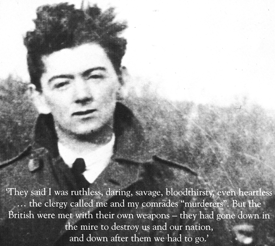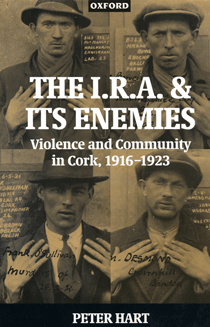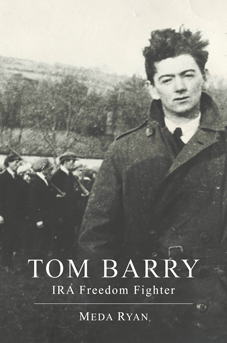The War of Independence 1919-2004: What Is The Dispute About Kilmichael And Dunmanway Really About?
 national |
history and heritage |
feature
national |
history and heritage |
feature  Friday December 03, 2004 16:31
Friday December 03, 2004 16:31 by Niall Meehan
by Niall Meehan
Battles Continue Over the Interpretation of Irish History
(An Indymedia Volunteer has asked me to introduce and to try and summarise the basis of the dispute over aspects of Irish history which has made some appearances on the site recently. This I attempt to do below – apologies in advance for the length of the ‘summary’)
 After simmering along on Indymedia for a number of weeks, a dispute over the actions of legendary guerrilla commander Tom Barry and the IRA in Cork during the 1919-22 period boiled over into print in The Village, the BBC, The Irish Examiner and The Sunday Times. The controversy relates to research by historians, Meda Ryan and Brian Murphy, criticising claims first put forward by former Queens history lecturer, now Memorial University Newfoundland academic, Peter Hart.
After simmering along on Indymedia for a number of weeks, a dispute over the actions of legendary guerrilla commander Tom Barry and the IRA in Cork during the 1919-22 period boiled over into print in The Village, the BBC, The Irish Examiner and The Sunday Times. The controversy relates to research by historians, Meda Ryan and Brian Murphy, criticising claims first put forward by former Queens history lecturer, now Memorial University Newfoundland academic, Peter Hart.
The dispute centres mainly on two areas:
1. Peter Hart’s attempt to overturn the long held and widely accepted view that British Auxiliaries fired on and killed three IRA soldiers after the Auxiliaries had called a surrender during the Kilmichael ambush in November 1920.
2. Peter Hart’s suggestion that the post-Truce killing of Protestant males in the area surrounding Dunmanway in April 1922 was part of a sectarian war being pursued by republican forces. Point 1 is related as it formed Hart’s launching pad into his thesis that the Anglo-Irish war was in reality a squalid battle for ethnic supremacy, and that the two states in Ireland are an expression of a mutually exclusive ethnic sectarianism (except that Hart is accused of under-reporting unionist sectarianism and British responsibility for using sectarianism as a method of government in Ireland).
In other words it is suggested that Hart sees Irish politics in the context of balkanisation, rather than in the context of colonialism and imperialism.
Kilmichael Critique
The critique of Hart on Kilmichael centres on the following
 - His two sources for the Kilmichael ambush are anonymous (now over 80 years after the event) and therefore difficult to test and to validate. Peter Hart says he carried out his interviews in 1988 and 1989 but, according to the records consulted by Meda Ryan, only one battle survivor was alive at that stage, but too infirm to repeat his account. Reportedly, none were alive on 19 November 1989, the date of Hart’s interview with the scout ‘AF’. According to Ryan, the last scout died in 1967, while the last survivor, Ned Young, died on November 13 1989. This is an anomaly that needs to be addressed – and for which there may be a simple explanation. As of yet, it has not been proffered.
- His two sources for the Kilmichael ambush are anonymous (now over 80 years after the event) and therefore difficult to test and to validate. Peter Hart says he carried out his interviews in 1988 and 1989 but, according to the records consulted by Meda Ryan, only one battle survivor was alive at that stage, but too infirm to repeat his account. Reportedly, none were alive on 19 November 1989, the date of Hart’s interview with the scout ‘AF’. According to Ryan, the last scout died in 1967, while the last survivor, Ned Young, died on November 13 1989. This is an anomaly that needs to be addressed – and for which there may be a simple explanation. As of yet, it has not been proffered.
- Hart accepts British inspired reports of the engagement, reports that Dr Brian Murphy demonstrated recently were produced by a sophisticated British propaganda unit run by Basil Clarke and Major CJC Street. Hart also accepts British documentation claiming to be the unsigned typewritten report of the battle by Barry to his superiors. Again, this is disputed, not least because of glaring errors of detail that it is suggested Barry would not have made. For instance the report says that two IRA soldiers died later and one on the spot. The opposite is the case (see Ryan, pages 59-60).
- Hart claims that Barry did not make the "false surrender" claim until the 1940s. Ryan showed that it was published in the 1920s. Hart’s apparently clinching point about Barry failing to mention in it in a major 1932 Irish Press article was refuted by showing that it had been edited out of the story, and that Barry himself had protested in writing. Ryan produced information to the effect that open discussion on the false surrender was common parlance among survivors of the ambush.
The Dunmanway Critique
On more than one occasion Hart quotes from original documentation in a way that seems to diminish British responsibility for promoting and provoking sectarianism, while appearing to highlight republican responsibility. For example, Brian Murphy pointed out that in order to portray the Dunmanway killings as sectarian, Hart quoted half a sentence from British intelligence documentation suggesting that Protestant farmers as such did not engage in active informing on behalf of the British during the War of Independence. Hart ignored the other half of the same sentence, where the British say that the one exception was the Bandon area (which includes Dunmanway). Bandon was unique in witnessing the promotion of unionist sectarianism in support of the British presence. The atmosphere surrounding Bandon is indicated by two well-known phrases describing the place: "the Londonderry of the South" and "even the pigs were Protestant".
- While Hart’s researches were not apparently thorough enough to uncover this, he also did not report on the exceptional organisation of loyalist paramilitary activity in association with British forces, that saw the use of extra-legal retribution alongside those forces.
 - Meda Ryan reported on the above and she also reported new information relating to the killing of Protestant males in April 1922, after the Truce. Ryan reported that the surnames of all of those shot, in defiance of an IRA amnesty for spies and informers, were on a list of "helpful citizens" left behind by the Auxiliaries when they evacuated Dunmanway Workhouse. In other words those shot were targeted because of their alleged association with sectarian paramilitary violence –and immediately after two individuals on the Dunmanway list had shot and killed an IRA officer. Sectarianism as a motive for the killings would not appear to have been paramount, or indeed a factor at all.
- Meda Ryan reported on the above and she also reported new information relating to the killing of Protestant males in April 1922, after the Truce. Ryan reported that the surnames of all of those shot, in defiance of an IRA amnesty for spies and informers, were on a list of "helpful citizens" left behind by the Auxiliaries when they evacuated Dunmanway Workhouse. In other words those shot were targeted because of their alleged association with sectarian paramilitary violence –and immediately after two individuals on the Dunmanway list had shot and killed an IRA officer. Sectarianism as a motive for the killings would not appear to have been paramount, or indeed a factor at all.
- Ryan reported extensively on the denunciation of the wave of killings by pro and anti treaty forces, on energetic efforts to stamp them out and to provide effective protection measures for those thought vulnerable to attack. Tom Barry was actively engaged in providing this protection, which included, according to Manus O’Riordan, denouncing some individuals seeking to take advantage of the atmosphere by stealing Protestant owned livestock. Peter Hart either ignored, was uninterested in, or just failed to uncover, this information.
- Ryan reported on Protestant support for the independence struggle, Hart largely ignored this point. Ryan reported on British and Protestant church comment on the absence of sectarianism in the fight being waged by those trying to achieve Irish independence. Again, Hart ignored this information.
Pseudo History
While Hart accuses his critics of a "faith based" and "pseudo" history, he has refused to comment on criticism based on matters of fact uncovered by both Murphy and Ryan. The re-emergence of this debate was sparked by the repetition of Hart’s view in Diarmaid Ferriter’s new survey of Irish history, without any reference to the substantive published critique of that view. Also sparking re-interest was John Bruton’s repetition of the Kilmichael and Dunmanway allegations in a review of Ferriter’s book in the Irish Independent. It would appear that Hart’s view was not subject to considered refutation. This raised the hackles of those who feel that the cogently argued alternative account was effectively censored out of academic and media existence.
After a long silence, and as a result of this recent renewed interest, Peter Hart committed himself on Indymedia.ie to responding to Ryan and Murphy, though where or when has not been clarified.
Some sophisticates are apparently unnerved by the specter of West Cork rustics laying claim a peoples’ history and by historians who do not politely tiptoe through, or unquestioningly accept the wisdom of those who inhabit, the groves of academe.
Faith in Hart
They suggest that this dispute is uninteresting, or that the Kilmichael ambush is unimportant to the extent that the Dunmanway killings are more worthy of attention. They forget that Ryan and Murphy tackle both events without hesitation. Some of this commentary may undoubtedly be blinded by the sectarian failings of the state that emerged out of the Civil War, but history is read backwards in seeking an original sectarian sin within the War of Independence. This is what makes such observers susceptible to accounts such as those promoted by Peter Hart, and why, ironically, they may be accepted largely as a matter of faith.
Then again Peter Hart may be right and his critics largely incorrect in their assessment. If so Hart has been reluctant to engage with them. This stance may puzzle those who are neutral on the matters in dispute. Is this a matter of disdain? No, because Hart says he "respects" Meda Ryan and Brian Murphy. Is it disinterest? No, because Peter Hart has continued to write on the subject. Is it lack of confidence in the validity of his research? Peter Hart appeared confident of his position in his interview on the BBC. Peter Hart can answer this question. It is to be hoped that he will, soon.
Revisionism, Post-Revisionism
 On a more general point, this debate reflects a continuing interest in Irish history. It also indicates the continuing relevance of the debate on "revisionism". Many historians express a wish to move on to a "post revisionist" view of the field, and this latter term assumes a defeat for the original revisionist project of undermining Irish nationalism per se.
On a more general point, this debate reflects a continuing interest in Irish history. It also indicates the continuing relevance of the debate on "revisionism". Many historians express a wish to move on to a "post revisionist" view of the field, and this latter term assumes a defeat for the original revisionist project of undermining Irish nationalism per se.
As one historian remarked to me recently, the revisionists were really commenting on the politics of the 1970s and 1980s, while ostensibly researching a more distant past. It was really a negative view of the violent explosion of discontent in the North post 1968. This point seems eminently sensible, since history is a reflection of the concerns of the present imposing themselves on a view of the past. The politics of the present in relation to the National Question are still very much an aspect of contemporary politics. Efforts to put the power-sharing executive in the North back together dominates the news agenda as I write.
A view of the National Question that relegates British responsibility for sectarianism and which elevates instead an indigenous ethnic sectarianism is highly contentious and is in itself political. It is a view of the conflict which is congenial, whether Peter Hart is aware of it or is concerned by it or not, to a unionist and pro-British view of the conflict. For unionism it is a reason for separation and for Britain a justification for adopting the role of neutral facilitator. This view of the conflict has been promoted over the course of the recent ‘Troubles’. Peter Hart has introduced the point as a defining characteristic of the original ‘Troubles’, the Anglo-Irish War of 1919-21.
Conclusion
In contesting the empirical or factual basis of Peter Hart’s view, Brian Murphy and Meda Ryan have furthered our understanding of the period.
Ryan’s meticulous examination of the minutiae of the Kilmichael ambush, the Dunmanway killings and the Crossbarry ambush (in which up to 40 British soldiers died), and her account of British treatment of prisoners, suspects and the civilian population generally helps to re-create the atmosphere of the period and the motivation of those taking part. As she is concerned with detailing the events at Dunmanway, Ryan brings us more detail on the interaction of Protestants and Catholics, differences of opinion within the Protestant community, and the peculiar situation in that part of Ireland than has traditionally been afforded.
Aside from its impact on our views of Kilmichael or Dunmanway, Brian Murphy’s research on media manipulation is fascinating. It adds to our understanding of the development of propaganda as a weapon of war. What also fascinates is Murphy’s research demonstrating that sophisticated British propaganda played a role in attempts to define the conflict then, and that it has re-emerged in contemporary historical accounts of the period. The revelation of persistent British attempts to define their enemies as sectarian, while themselves promoting sectarian allies, may inform our view of the present as much as it may help our understanding of the past.
While I am sympathetic to the view put forward by Ryan and by Murphy, it is clear that Hart’s industriousness was a stimulus for the production of alternative accounts of the period. It may be that positive aspects of Hart’s research have become obscured by the dispute. If commentary has become polemicised, this may be due to the absence of a reaction from Peter Hart to the criticism put forward by Ryan and by Murphy. It would appear to be the case that making a loud noise has more chance of eliciting a response.
And, despite Peter Hart’s somewhat negative view of the contributions, the debate on Indymedia has perhaps rekindled an interest in History among the many who are less and less likely to take it as a subject in Irish schools. Why is history in decline as a school subject? Is it due to lack of interest in history? Between 1,500 and 2,000 attended the Kilmichael commemoration on November 28th and heard Meda Ryan’s oration, so popular interest in aspects of Irish history appears intact. Or is it lack of interest in the written history that is presented to them that switches modern students off?
The historians may say that it is not their task to provide partisan accounts of any particular period. It is possible that partisanship from another direction may silently intrude, however, especially when grappling with historical events with pressing contemporary parallels – the terms IRA, violence and conflict being highly charged in current circumstances. Ideology takes many forms, the denial of its presence being merely one. Objectivity may inform the historical method but it is never an end in itself and never at an end, just like the historical journey.
While there are clear differences in overall view between Ryan and Murphy on the one hand and Peter Hart on the other, the practicality of explicating the differences boils down to the interpretation and acceptance of documentation and other important evidence.
A more objective view may arrive during the course of debate. And debate is what we are waiting for.